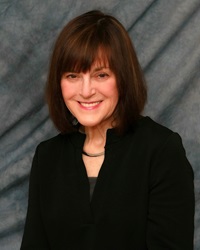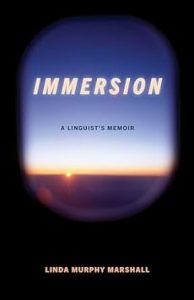The Process Of Writing My Memoir by Linda Murphy Marshall
by Linda Murphy Marshall – author of Immersion: A Linguist’s Memoir
 Several years ago, when I first read Joan Didion’s quote about the writing process, I realized that her thoughts reflected how my writing process unfolds: “I don’t know what I think until I write about it.” I might think I have a clear-cut vision and roadmap for a memoir or essay but, once I’m in the process of writing, something else kicks in and it feels like I’m being led hither thither and yon, and perhaps not in the direction I’d initially intended. But follow, I must, and I usually end up with — I believe — a superior finished product than if I’d been steadfast in adhering to my previous plan.
Several years ago, when I first read Joan Didion’s quote about the writing process, I realized that her thoughts reflected how my writing process unfolds: “I don’t know what I think until I write about it.” I might think I have a clear-cut vision and roadmap for a memoir or essay but, once I’m in the process of writing, something else kicks in and it feels like I’m being led hither thither and yon, and perhaps not in the direction I’d initially intended. But follow, I must, and I usually end up with — I believe — a superior finished product than if I’d been steadfast in adhering to my previous plan.
When I decided to write my second memoir – Immersion: A Linguist’s Memoir — I set out to write about my numerous work assignments overseas, as well as my junior year in Spain. I’d intended it to be a travelogue of sorts, a way to establish my legacy. This was particularly important to me because, when I went on the work trips to Africa — most of them in dangerous or potentially dangerous circumstances — only a handful of people were aware of what had happened on these trips. The purpose and details were classified, so my experiences were close hold, except for a few people. Added to that, right or wrong, I believed that friends, family, acquaintances viewed me as someone who’d led a sheltered life. Maybe I’d traveled, but they had no idea the often perilous conditions I was in on these trips. I wanted to set the record straight.
Getting permission to write about these assignments was an integral part of the process, since they had been classified trips, but I had to have a manuscript in hand to show government officials before I could submit my memoir to them. They had to see/read exactly what I’d written, ensure that I hadn’t inadvertently revealed sources and methods in my narrative. Since much of it had occurred in the late 1980s, 1990s, with the final trip occurring in 2008, I didn’t think I was at risk of having government officials reject my memoir, but I wouldn’t know until the book had been written, the last words of the last chapter set down for them to review.
As I indicated, this was meant to be more or less a travelogue, so I picked eight representative countries to write a chapter about, even though I’d been on more than a dozen work assignments. In that way, I thought it would be more manageable: a geographical classification. I’d write about my junior year in Spain, my time working in Brazil, and government-assigned trips to Zambia, the Democratic Republic of Congo, South Africa, Tanzania, Kenya, and Ethiopia. That way of dividing up my narrative made it feel less overwhelming……But then I began to write, and my plan went in other directions.
Each country, each chapter led me on physical journeys, as anticipated, but also on emotional journeys. Ultimately, writing about these trips led me to the realization of changes I’d undergone as a result of leaving behind what was familiar. I left as one person and returned a different one. Only in writing about these experiences, did I come to realize who I was, who I was becoming, much like Joan Didion described it in her quote.
For example, I initially set out to write about my junior year in Madrid, Spain, recording my impressions of living in a foreign country for the first time: the different foods, speaking Spanish, making new friends, the challenges I faced. But as I wrote, I uncovered deeper truths, namely, that here, finally, was something I excelled at: Spanish. I was no longer barely-above-average-Linda trying to gain the respect of my parents and siblings.
I’d been lifted out of a toxic family environment and could see myself independently from them, not seeing myself in that family mirror. Writing about this was a revelation for me and went far beyond the travelogue I’d initially envisioned. The writing process enabled me to see that year through different eyes, to see myself through a different lens for the first time. And it was only possible because I wrote about it; only then did I realize its importance.
When I initially wrote about my assignment in Brazil, I thought in terms of being immersed in Brazil’s outback, in translating and interpreting a wide variety of written and spoken material, in eating different foods, listening to different music. But in actually putting pen to paper, linking all the components of my trip together, the people, the food, the music, the work, the weather, the architecture, etc. I made important discoveries. What I hadn’t realized until I let myself dig deeper and deeper into this experience was that, although it only lasted a little over three weeks, in lifting me out of the environment I’d left behind in my Midwestern State, without internet, cellphones, mail, etc. I saw myself in a new light. I began to re-envision my worth, who I was. And, when I returned from that life-changing trip I was able to make decisions that altered the course of my life.
Only by including this in my memoir, did I realize the significance of that trip, how it had changed my life and begun to change the way I viewed myself. Brazil wasn’t just speaking Portuguese, meeting fascinating people, eating exotic foods; it was part of an epiphany I’d been too close to at the time to ingest. I had to write about it, all of it — Spain, Tanzania, Kenya, South Africa, etc. — to, in Didion’s words, know what I thought about it.
After I’d submitted several chapters to my editor — a brilliant writer herself — she realized what was happening before I did. “This isn’t a memoir about your travels,” she e-mailed me, after reading my words. “You’re on a quest to find your personal identity, to separate yourself from what others have always written/said about you. These journeys are the means to discovering who you are, independent of others’ opinion of you.”
The lesson, then, at least for me, is to have a loose outline, a broad plan for what I want to write, but to follow my muse, some inner voice, where it may leads. That’s where the truth lies.
—
 Fans of the self-discovering journeys in Cheryl Strayed’s Wild and Andrew McCarthy’s The Longest Way Home will love diving into linguist Linda Murphy Marshall’s adventure-filled international journey as she overcomes her past to find her place in the world—all over the world.
Fans of the self-discovering journeys in Cheryl Strayed’s Wild and Andrew McCarthy’s The Longest Way Home will love diving into linguist Linda Murphy Marshall’s adventure-filled international journey as she overcomes her past to find her place in the world—all over the world.
Immersion is a memoir that takes the reader on a captivating emotional and physical journey through Linda Murphy Marshall’s life: from the longstanding, crippling impact of family members’ low expectations and abuse, to her discovery as a young adult that she possesses special skills in foreign languages.
Linda is taught from an early age that she has little of value to offer the world. But her love of and affinity for languages enables her to create a new life—to separate herself from her toxic environment and to build a successful, decades-long career as a professional multilinguist. It’s a rewarding vocation, but a challenging one: her assignments with the US federal government take her on some hair-raisingly dangerous journeys, some to countries with unstable governments and even active war zones. But these sometimes-harrowing experiences teach her how to open the “windows” around her, unearth her true self, and develop a healthy sense of self-worth—and ultimately, paradoxically, her work and travel so far from home allow her to come home to herself.
BUY HERE
Linda Murphy Marshall is a translator and linguist whose work has been published in numerous literary journals, including the Los Angeles Review, Blue Earth Review and many more. Her first memoir, Ivy Lodge: A Memoir of Translation and Discovery, received a starred review from Kirkus. She lives in Columbia, Maryland with her husband.
Marshall worked as a senior language analyst and senior intelligence analyst at the National Security Agency for over thirty years. She currently serves on the board of the National Museum of Language and has been a docent at the Library of Congress in Washington, D.C. since 2016.
Category: On Writing






























